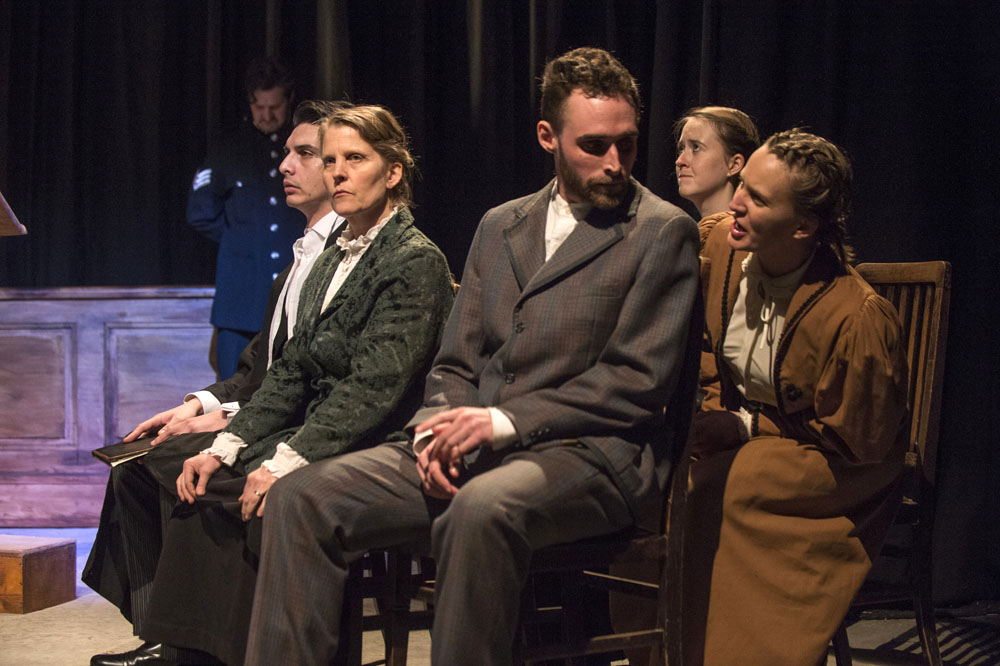
To follow one’s own conscience in times of war, to place humanity ahead of patriotism, can be seen as a dangerously subversive act.
In Pacifists and Protestors, writer and director Alexander Gifford has montaged a play, A Dangerous Woman, performed in two parts, with a dramatic rendering of the words of contemporary WWI poets, pacifists and protestors, that features choreographed movement to music.
A Dangerous Woman is a powerful telling of the story of Alice Wheeldon, a committed socialist, suffragette and peace activist, known to be harbouring conscientious objectors on the run at her home in Derby. She was to become a target of MI5, who sent an agent posing as another ‘conchie’. Wheeldon was undone by a deal she struck with the agent, Alex Gordon, who led her to believe that her son and one of her ‘charges’, Thomas, would be given assisted passage to the United States, if she could supply poison to knock out the guard dogs at an internment camp for objectors, thereby assisting an escape.
The politically motivated ‘sting’ then moved through the gears. Alice, incredibly, was then charged, later convicted, of plotting to poison the Prime Minister, David Lloyd George, along with her daughter Winnie and son-in-law Alf Mason, based on the verbatim reports of the agent, who never appeared in court, and her intercepted letters that criticised the government for its pro-war stance. To ensure a guilty verdict, none other than the then Attorney General, Sir Frederick Smith, was rolled out to lead the prosecution.
From start to finish, this was an emotionally charged and suspenseful production from the Gloucester Theatre Company, with standout performances all round. Penelope Wildgoose gave Wheeldon a feistiness, a visceral anger, that pervaded the theatre, while Winnie, played by Amy Vickers, and Hettie, acted by Stepanie Hazel were an effective double act, both as critics of and consolers to their mother, as the miscarriage of justice unfolded. Matthew Ducket was, by turn, convincingly fragile as Thomas, the mentally scarred soldier on the run and, later, chilling as prosecuting attorney, Smith. Michael Skellern conveyed, perfectly, the out-maneuvered helplessness of defending council Saiyis Riza.
Beside the drama of the court scenes, relationships were richly explored between the characters. In particular, Winnie and Hettie’s conflicting approaches to their parents; Alice’s husband’s, John’s, journey from gruffness and isolation to contrition; and Alf Mason’s naivety, were all well observed.
A gripping tale told brilliantly, the production, I felt, was undermined slightly by an unnecessarily sentimental last scene, in which the recently deceased Alice seemed to be in conversation with god. Wheeldon was an atheist, so this just seemed wrong.
The second half of the second half I understood, but was not completely convinced by. Yes, the verbatim words of the likes of Siegfried Sassoon, antiwar activist Edmund Morel, conscientious objector Harold Bing and others were powerful messages of pacifism. And Penelope Wildgoose also delivered a beautiful acapella rendering of ‘Through the Darkness Christ Will Come For Me’, while the side-lit artificial poppies at the back of stage presented a new sense of irony. But somehow the presentation, that included choreographed slow-mo battle and its aftermath, seemed not at odds with what had preceded it, but distracted away from the power of the Alice Wheeldon story. Her voice, her injustice, had seemed enough on the night. ★★★★☆ Simon Bishop 15th February 2018

